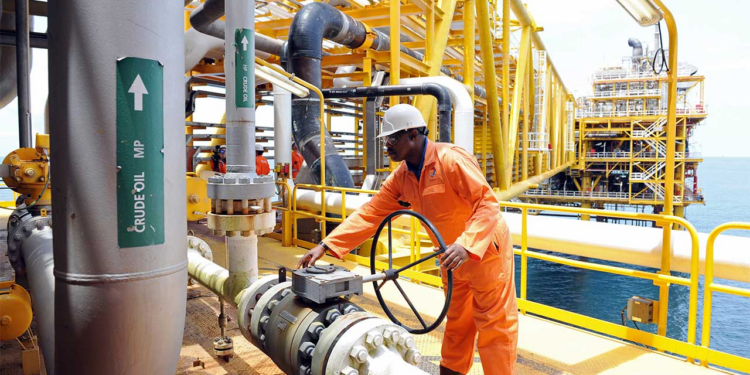Nigeria has been named among three top countries in terms of highest oil reserves discovered owing to 2023 investments.
Others are Guyana and Namibia according to a research conducted by Rystad Energy.
Also, global spending on conventional oil and gas exploration will hit over $50 billion in 2023, according to an energy research company.
Upstream companies are strategically directing their investments towards offshore projects, focusing on lucrative regions that have a robust geological understanding.
Rystad Energy said 95 per cent of the total expenditure in 2023 is allocated to offshore initiatives.
“Upstream companies are facing a period of uncertainty. They are eager to capitalise on the increased demand for fossil fuels and find additional resources,” Aatisha Mahajan, vice president of upstream research, Rystad Energy, said in a report.
Global majors, including ExxonMobil, bp, Shell, TotalEnergies, Eni and Chevron, and National Oil Companies are expected to account for over half of the spending with the majors directing a total $7 billion in exploration projects in 2023.
But despite huge oil and gas deposits the Organisation of the Petroleum Exporting Countries (OPEC) said that Nigeria’s economic growth in the first quarter of 2023 (1Q23) stood at 2.4 per cent year-on-year (y-o-y).
OPEC made this known in its Monthly Oil Market Report for August.
OPEC said this was against a growth of 3.6 per cent in the fourth quarter of 2022, an indicator of 2023 anticipated slowdown.
According to the report, after Nigeria’s economy grew by 3.3 per cent in 2022, it is forecast to decelerate in 2023.
It said high inflation continued to burden Nigeria’s economy.
“Inflation data for June shows an ongoing acceleration, with an annual rate of 22.8 per cent y-o-y, following 22.4 per cent y-o-y in May and 22.2 per cent in April and 22 per cent in March.
“Food inflation has been a key factor in this rise, reaching 25.1 per cent year-on-year (y-o-y) in June, after 24.8 per cent y-o-y in May.
“A combination of factors including conflict, the impact of climate change, population pressures, and the below-average output of the agricultural sector, exacerbated the scarcity of food resources over recent years,’’ it said.
To assist, it said, the Nigerian government had unveiled a comprehensive financial package amounting to N500 billion.
To lower inflation, the report said the Central Bank of Nigeria (CBN) lifted the key policy rate by 25 basis points to 18.75 per cent in July.
As a consequence of the ongoing challenges, it said, in May 2023, Stanbic IBTC Bank Nigeria Purchasing Managers Index retracted to stand at 51.7 in July, after a level of 53.2 in June was reached.
This follows observation by the Nigerian Upstream Petroleum Regulatory Commission, NUPRC, that the country’s crude oil production dropped by 12.56 per cent in July to 1.29 million barrels daily from 1.48 million barrels daily in June.
According to the NUPRC, one of the reasons for the decline was the temporary shutdown of the Forcados terminal, which Shell, the operator, said in mid-July on suspicions of a leak.
The Forcados sees loadings of an average of 220,000 barrels daily but on July 12 workers in the area saw fumes near a vessel that was being loaded with crude. The repairs work on the terminal was expected to be completed by the end of the first week of August but as of the middle of this week, Forcados remained shut down.
Earlier this year, the commission warned that Nigeria is producing one million bpd of crude less than it has the capacity to produce.
The agency cited a lack of investments, a shortage of funding sources because of the energy transition, and insecurity among the factors driving the situation.
“Currently, Nigeria has the technical allowable capacity to produce about 2.5 million barrels of oil per day.
However, arising from the highlighted challenges, our current production hovers around 1.5 million barrels of oil and condensate per day,” the chief executive of the body said in May.
To remedy matters, Nigeria, earlier this month, announced the pending launch of a roadshow to pitch upstream investments in the country.
“Whereas the global imperatives for energy transition is clear and justified, the need for Africa’s energy security, economic development and prosperity cannot be overemphasised,” the Nigerian regulator, which is organising the roadshow, said.
According to a senior Petroleum ministry official, Nigeria is looking to boost its oil production to 1.7 million barrels daily by November this year.
Equally, the Nigeria Extractive Industry Transparency Initiative (NEITI) said, Nigeria lost over 619.7 million barrels of crude oil valued at $46.16billion or N16.25 trillion from 2009 to 2020 from theft and sabotage.
Executive secretary of NEITI, Dr. Ogbonnaya Orji, who presented the report as a part of his remarks at the Stakeholder’s roundtable for the review and approval of NEITI Audit Reports in Abuja said: “In addition, NEITI reports have disclosed that Nigeria lost over 619.7 million barrels of crude oil valued at $46.16 billion or N16.25 trillion from 2009 to 2020 from theft and sabotage. This amounts to losing over 140,000 barrels of crude valued at $10.7 million daily.”



